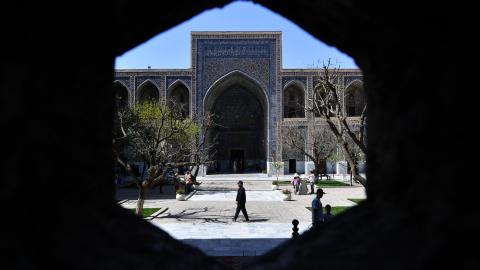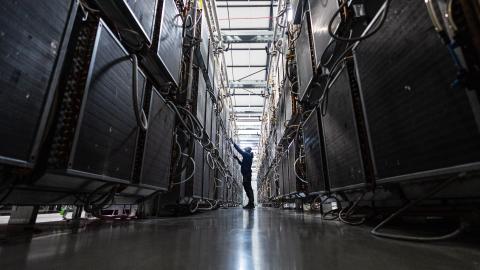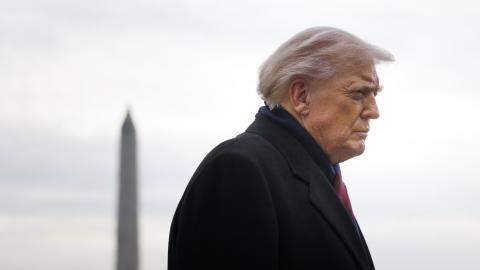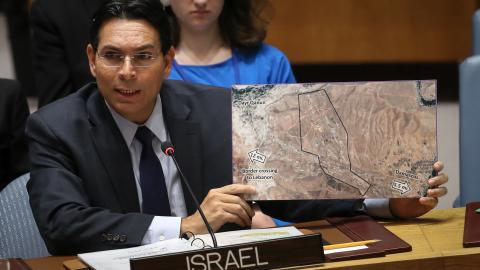"Many people think the United States saves Israel, but the truth is that today Israel's role is to save the United States from itself," this surprising statement by Dr. Michael Doran, an American expert on the Middle East, received thunderous applause from the audience at the "Freedom of Zion" conference, recently held at Binyanei HaUma, organized by the Center for Israeli Freedom, formerly the Tikvah Fund.
When we met a few days later, I asked Doran to elaborate on this statement, which while pleasing to Israeli ears, also raises questions.
"When people talk about 'Israel' in American discourse, it's never 'just about Israel,'" Doran responds. "Behind the scenes of the Israel debate, there's actually a debate between Americans: when progressives on the left criticize Israel and claim Palestinians are suffering under Israeli rule, while evangelical Christians argue that the US should support Jewish settlement in Judea and Samaria (Doran insists on using 'Judea and Samaria' rather than 'West Bank') – the underlying discussion is about which values should be dominant in American society itself.
"I personally believe that the commitment to Israel reflects the deeper values of the United States. This commitment reminds the US of its role in the world and what it represents. As we can see, this discussion extends beyond America's borders. The attitude toward Israel touches deep chords within European culture, for example. In my view, as long as the West continues to be committed to the traditional values that we all see as the great values of the West, it must support Israel."
Q: Since the war, I've heard conservatives worldwide saying they'd like to see their societies become more like Israeli society as they perceive it: a society mobilized against threats, embracing family values, where religious and national narratives are present. Is that what you're referring to?
"Absolutely yes. Your society wants to continue thriving, while the West is being swept by a great current of nihilism and suicidal aspirations from some of its elites, which also guide our politics. Even if you compare birth rates between secular Israelis and what's common in Western countries, you'll find a big difference. That tells us everything we need to know."
Michael Doran (62) holds a PhD in Middle Eastern Studies from Princeton University and is a senior fellow at the conservative Hudson Institute, where he directs the "Center for Peace and Security in the Middle East." He previously held senior advisory positions related to US foreign policy in the Middle East – as Deputy Assistant Secretary of Defense in the George W. Bush administration, and as a senior advisor to the National Security Council and the US State Department. He enjoys extensive connections with Israeli government leadership; he requested to schedule our interview for early morning hours because "during the day I'm supposed to meet with your prime minister," as he simply remarked.
Speaking excellent Hebrew and understanding it perfectly, many mistakenly assume he has a Jewish background. "I grew up in a Christian-atheist home, but today I'm Catholic," Doran says with a smile. He has visited Israel several times during the recent war, and knows the threats to Israel firsthand. "I was in the north during Hezbollah's rocket attacks, and had to lie down on the street during an alert. I know what we're talking about," he says. Many Israelis know him from his podcast with Gadi Taub, which began during the war, or from his book translated into Hebrew, "Suez Junction: Operation Kadesh and the American Turning Point in the Middle East" (Shibolet, 2023).
Turkish march
The rapid events leading to the Bashar Assad regime's fall surprised even veteran Middle East observers. Doran, who has many connections with Turkish sources, notes that Israel's successful military activity against Hezbollah, Russia's struggles in Ukraine, and the Assad regime's economic distress following US sanctions – provided the background that allowed Recep Tayyip Erdogan to move rebel groups southward and launch an operation to topple the regime.
"When it comes to Syria, one can get lost among the various opposing forces operating there, but in the simplest strategic terms – the regime's fall is a major move by the Turks," he explains. "The two main players among the rebel groups that operated in Syria are Hayat Tahrir al-Sham (HTS) and the Free Syrian Army (FSA). The first is a semi-independent organization influenced by Turkey and cannot operate without its consent. The Free Syrian Army is already a direct Turkish proxy, under complete Turkish control.
"We need to understand that Turkey operates in Syria with two main interests: The first is to eliminate the autonomous regions controlled by the PKK, an underground Kurdish organization also operating in Turkey, which wants to establish an independent Kurdish state including Turkish territory. Naturally, Turkey sees this as a direct threat to its national security. For the first time in history, the Kurdish separatist organization achieved continuous territorial control across all Kurdish areas in Syria, under the protection of supporting American forces. This obviously provokes Turkish anger. Turkey's second interest is returning the Syrian refugees who arrived in their territory when the civil war broke out, estimated at five million. Erdogan is under significant political pressure regarding their presence in the country. He knows their return will only be possible if Syria achieves basic economic stability allowing them to return home."
Q: It sounds like Erdogan has conflicting interests with the US. How will this work?
"I believe Erdogan is waiting for January 20 to negotiate Syria's future with Donald Trump. First and foremost, Turkey wants to free northeastern Syria from US-backed Kurdish forces. Ankara might pressure the US to withdraw from this region, leaving the territory to Turkish-backed forces. Turkey doesn't necessarily oppose the presence of US forces in Syria, or Kurdish forces it's willing to tolerate, but it won't accept these forces supporting PKK Kurds. The likely scenario, in my view, is that Trump will withdraw all American forces from Syria."
Q: How do you view what happened in Syria in the context of Israeli interests?
"For now at least, the rebels under Abu Mohammad al-Julani have moderated their positions, at least for Western ears. However, his group's roots lie deep in radical Islam, and this could certainly pose a long-term challenge. The Houthis have already publicly approached al-Julani and offered him to 'join the jihad against Israel.' The rebels won't necessarily succeed in stabilizing the country, and internal forces and disputes between different groups within Syria might lead it into chaos like Libya. The internal polarization in Syria makes it impossible to see one force uniting all these groups under one roof. Let's also remember that every Arab state is ultimately controlled by its internal security services. This has been true in Syria for years. Who will build this new apparatus and what will it look like? Syria in its current state is very fragile, and we'll continue to see external forces operating within it through local forces. The structure of the new security services is much more significant than the parliament or any other official governing structure that will exist in Syria."
"Israel has a blind spot regarding partnerships within Syria. I think you're already working more and more with the Druze community in Syria, which is a good direction. If I had to advise Israel, I would say that Israel will have to be more involved in Syria, which will require developing local proxy groups that rely on Israeli support. It can start with the Druze, but later other groups can and should be activated as well. Not to undermine Syrian governance of course, but to maintain Israeli security at the border, and so that Israel has a meaningful say about Syria in the aftermath, whenever that may come."
"In a broader perspective," Doran adds, "We're slightly more than a year after the October 7 attacks, but we can certainly say that the power dynamic between Israel and Iran in the Middle East has changed dramatically in the past year in Israel's favor. The Houthis are still causing trouble, and I wouldn't underestimate Hamas's and especially Hezbollah's ability to reorganize in the foreseeable future. And yet, this is indeed quite a remarkable development."
Q: What are the implications of the damage to the Russian-Iranian alliance in Syria?
"Erdogan didn't just destroy the Russian-Iranian alliance in Syria, but also damaged the Russian-Iranian combination that was dominant in the Ukraine war. We must remember that Turkey prominently supports the Ukrainians. The Turkish military is the second largest in NATO, so Erdogan is in an excellent position to negotiate with Russia and the US simultaneously regarding Syria's future, as well as Ukraine's future. He has significantly strengthened Trump's position against Putin, and now he has cards to play against the Russians too. For example, the Russians signed a 49-year contract with Assad for their naval base in Tartus, which is vital for their Mediterranean fleet, as well as the nearby Khmeimim air base. As of now, the Russians have evacuated it, but what about the long term? Do the Russians want to return there, and if so, under what conditions? Everything is still open."
The enemy of my enemy
Despite the obvious hostility between Israel and Turkey, Doran paints a more complex picture. In his view, Israel should study the new situation and perhaps even benefit from Turkey's strengthening, certainly when it comes at the expense of the collapsing Iranian axis.
"There's no doubt that there's a very strong anti-Israel sentiment in Turkey, which Erdogan shares, but there's no sign that this is part of a revolutionary Islamic foreign policy. Turkish society has actually become less Islamic in the last decade, due to internal rivalry and the 2016 coup attempt, which created a new balance between Erdogan and the security establishment. Today, Erdogan's control over security and foreign policy isn't exclusive. The security establishment plays the largest role, and its approach isn't Islamist but rather realpolitik. And it's based on the view that Kurdish separatists, the PKK, are the number one threat to the republic's existence."
"Erdogan's career itself is an example of realpolitik. He's made sharp political turns and partner changes that can't be explained by commitment to Islamic ideology. If Erdogan is an Islamist, then Islamism is his mistress. His faithful wife is realpolitik. On weekends, when his wife visits her mother, he might visit Islamism and think nostalgically about how the world could have looked if things had worked out differently."
"All Turks hate the PKK, and in fact, most Kurds do too. Israel expresses its hostility to Erdogan and 'Islamic' Syria these days by expressing support for the Kurds – which in this context means supporting the PKK. This isn't wise, because Erdogan is united with the security establishment behind the war against the PKK, just as Israel is united behind the idea of destroying Hamas. A pro-PKK policy from Israel will unite the Turks against Israel. The smarter move is to seek a pragmatic understanding with the Turks in Syria, one where Syria becomes a buffer state, like Jordan. Israel should demand from the new Syrian government that Syrian territory not be used by Iran, neither against Israel nor to strengthen Hezbollah, and that it not be used for attacks against Israel. Such an agreement is easy to achieve with Turkey, but not if Israel supports the 'Kurds.'"
Q: Erdogan is seen here as a clear Muslim Brotherhood figure.
"Erdogan is not a 'Muslim Brother' for a simple reason: he's Turkish, and the Muslim Brotherhood is an Arab organization. Turkish Islamism comes with a strong dose of Ottoman nostalgia, meaning the assumption that Turkey should be the leader of Muslims, and that's already a recipe for conflict between Arabs and Turks. Erdogan comes from an Islamist background, but there's no evidence that he bases his foreign and security policy on an Islamist agenda."
Q: Can you see Israel and Turkey returning to a state of cooperation in the future?
"No, I don't have hopes that Israel and Turkey under Erdogan will work in close cooperation. What I think is possible are quiet understandings regarding Syria's future. This should be the goal of Ankara, Jerusalem, and Washington, and it's achievable."
The empire or the republic
Since October 7, Israel has been dealing not only with growing hostility in the Democratic Party's left wing but also with voices in the Republican camp opposing continued American aid to Israel. The most prominent and popular among them is host Tucker Carlson, formerly of the right-wing Fox News, and currently hosting a daily current affairs program watched by millions on social media. During the war, Carlson sharply criticized President Joe Biden for the aid he sent to Israel, accused Israel of committing war crimes, and raised claims bordering on antisemitism, such as echoing messages that Israel encourages harm to Christians living in its territory. He's part of a growing faction within the Republican Party that's indifferent to Israel or even explicitly opposes Israel and Zionism. Carlson's views could be cause for concern, as he belongs to President-elect Donald Trump's inner circle.
"Personally, I do think Carlson has a problem with the State of Israel and maybe with Jews too, but let's put that aside," says Doran. "His positions toward Israel are shared by some people in Trump's coalition who aren't anti-Israel or antisemitic, but they also wouldn't want the US to remain involved in the Middle East."
Q: Can you explain this position?
"They believe that the 'American Empire,' as they call US involvement in the world, is destroying the 'American Republic,' meaning America's own interests and needs. In their view, going to wars around the world is meant to strengthen and enrich existing American elites. They think these resources should be directed inward. Such voices say: 'Let's just leave the Middle East.'"
Q: If I'm an American citizen, why should I care about a distant place in the Middle East called Israel, with wars that I need to keep funding?
"We should know that such thoughts weren't born yesterday. They have a long history going back to the founding of the American Republic. Thomas Jefferson, one of the founding fathers, thought America should be a small country that takes care of its people and isn't involved in foreign interests. I tell those who hold such views that the United States still must strive for a world with a strong American presence, because there's still a critical need for it. The US needs to maintain significant positions in the world – in Asia, the Middle East, Europe, and other places – because American freedom depends on it. The real danger to the US comes from rapid and unplanned withdrawal around the world."
"The US today is dealing with the formation of forces – Russia, China, Iran, and North Korea – that want to change the entire world order and shape it in their image. Their economic control would severely harm the US and the West in general. If they take control of the Middle East, it's just a small jump to Europe. And if they become dominant in Eurasia, they'll pose an absolute threat to American freedom there. Any American policy must ensure that this group doesn't become dominant or hegemonic. We need to work with Japan, Korea, India, and European allies, and of course with Israel, to prevent Eurasia from being under the shadow of these forces. A world order shaped by China, Russia, and Iran would create a completely different world, regardless of where you live, in the US or outside it."
Q: Which wing is more influential today within the Republican Party?
"I think those people who call for overturning our traditional support for Israel are absolutely in the minority. Many Americans, like me, see Israel as a family member of the US that needs to be protected, and I think we're still the overwhelming majority among Republicans, and among Americans in general. If we look at Trump's appointments to senior positions in his administration, the result is clear: with Marco Rubio as the next Secretary of State, Michael Waltz as National Security Advisor, Elise Stefanik as UN Ambassador, and Mike Huckabee as Ambassador to Israel – all undoubtedly strong Israel supporters, it certainly sends a clear message that Trump intends to be very supportive and friendly to Jerusalem."
"I talk to many Israelis, and the feeling is that the world has completely changed between Biden and Trump. Trump and his team will be very pro-Israel. Their opposition to Iran will also be much stronger than Biden's people. Obama's policy, which sought compromise with Iran, led to Iran's rise throughout the region in the last two decades. It became a potential nuclear power, and we haven't seen an effective American response to that. Trump's people won't make such mistakes."
"The only question for me, which I don't have an answer to, is whether Trump will support a military operation against Iran. He came to office against the background of the Ukraine war, with a message that he's not interested in starting major wars. He might decide that the best strategy is attempting to fight Iran but without significant military action, and here a point of friction with Jerusalem might develop."
Q: After Hamas, Hezbollah, and the fall of the Assad regime, many Israelis are marking the next target: Iran. After the previous successful action in Iran, there's thinking here that perhaps Israel can strike Iranian nuclear facilities alone.
"Even if Israel acts alone, it still needs the US. Not just for the Security Council veto, but to prevent Iran from expanding the front. Iran can respond to an attack from Israel by attacking Saudi Arabia or the UAE. They might claim it's proven they're cooperating with Israel in attacks on Iran. In any case, it's hard to imagine a scenario where the US isn't involved at some military level, even if it's just defending other allies."
Q: What would you like to see Trump do in his first year in office?
"Personally, I'd like to see Trump seize the opportunity. I see Iran's rise as the biggest challenge for the United States in the Middle East, and believe Iran is a weak link in this group of forces – Russia, China, North Korea, and Iran. I'd like to see him deliver a strong opening blow and attack Iran's nuclear facilities. If at the beginning of his term he launches a significant attack on Iran, I think it will positively affect the deterrence of China, Russia, and North Korea, and of course Israel's security as well."
Q: In the Israeli Right, there are those who dream of annexing part of the Gaza Strip the day after the war ends. Do you think there's a way to sell this to the new administration?
"Listen, I'm not against it. But if I were advising you, the focus should be on the biggest problem for Israel's security, which is defeating Iran. Everything else is secondary."
Q: How should the Trump administration respond to the ICC arrest warrants against Netanyahu and Gallant? In the Republican Party, there are those suggesting imposing sanctions on Canada, for example, in response to its support for the court's decision. Are such steps realistic in your view?
"Absolutely yes. I think Congress should impose sanctions on any country that supports this move. I think it should send the clearest possible message that supporting such a move is supporting Iran's attack on the legitimacy of an American ally, and take the strongest possible response. There's no reason not to."
Q: Can the United States lead the West without major support centers that see it as a force driving positive global trends? The dominance of the left and complacency among European elites, as well as their attitude toward Israel, aren't very encouraging in this context.
"Even when the situation sometimes appears discouraging – and I can understand how one might view the West that way today – compared to other countries in the world, like China, which project strength externally, I think it's entirely possible. When I was in high school in the 1970s, and later as a student into the 1980s, it wasn't at all clear to me that the United States was winning the Cold War. When I went to college, I had quite a few Marxist professors. Some believed that the United States was in decline and that international political decisions had to be constrained by the Soviet Union. Today, we all know how the Cold War ended, but at the time, it wasn't clear at all."
"Nevertheless, the United States needs allies. The strategic goal, as I mentioned, is to prevent Iran from becoming dominant in the Middle East, and therefore we need Israel stronger than ever. We need the Europeans to do their part in their corner of the world against the Russian threat, and the Japanese, Koreans, Australians, and Indians strong against the Chinese threat. We must prevent the opposing alliance, with all its conflicting players, from working together and achieving the hegemony they desire. Only the United States has the global influence and vision that can unite all these different players. Yes, we should expect many upheavals in the Middle East over the next decade, and perhaps beyond. It's important that you remain strong."
Enjoyed this interview? Subscribe to Hudson’s newsletters to stay up to date with our latest content.


















